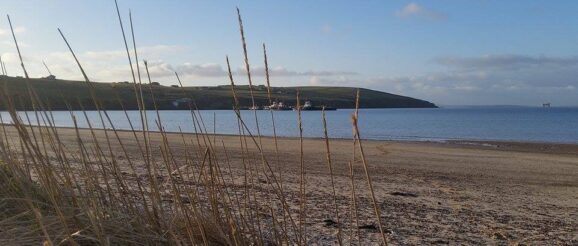Orkney – An ‘Innovation’ FREEPORT ? – The Orkney News

Discussions are at an early stage in Orkney to create an ‘Innovation FREEPORT’. What is this? and what would it actually mean?
At the second Zoom talk for the Sustainable Orkney Conference, Gareth Davies, outlined the ‘Orkney Context’ of where the islands are at now and where it could go in the future to create a sustainable economy.
Gareth highlighted the various projects Orkney has already got well underway and the recently developed ReFLEX initiative.
Despite being self sufficient in renewable energy since 2013 Orkney continues to have the highest rate of fuel poverty in the UK. Inequality is built into the energy supply and generation system.
Orkney benefitted from significant funding streams coming through membership of the European Union (see linked story above). For Orkney, which voted overwhelming to remain in the EU, leaving the free movement of goods and people across Europe will have profound negative consequences for the local economy. From investment in renewable projects, through to research in our universities to support for farming as a less favoured area and our fishing communities – across the whole economy Orkney will be hit hard by the UK leaving the EU.
So all that is happening and finding a replacement for the funding that came through the EU will be extremely difficult.
Gareth Davies raised the option of Orkney becoming an ‘Innovation FREEPORT’.
The UK Government is wanting to establish 10 FREEPORTS.
The government has the following objectives for UK Freeports:
Sea, air and rail ports in England will be invited to bid for Freeport status before the end of 2020, with the UK Government aiming for the first of the new sites to be open for business in 2021.
FREEPORTS in the UK will be able to have:
Discussions are also underway with the governments in Scotland, Wales and the Northern Ireland administration on developing FREEPORTS.
At a freeport, imports can enter with simplified customs documentation and without paying tariffs. Businesses operating inside designated areas in and around the port can manufacture goods using the imports and add value, before exporting again without ever facing the full tariffs or procedures. If the goods move out of the freeport into another part of the country, however, they have to go through the full import process, including paying any tariffs. Institute for Government
There is no separate category for an ‘Innovation FREEPORT’ – ‘ innovation is included as one of the 3 main objectives for the UK’s FREEPORT strategy.
The UK, when it was a member of the EU did have FREEPORTS. It had 7 between 1984 and 2012 however did not renew the legislation which established them.
The European Parliament has recently called for FREEPORTS to be scrapped as they are used for money laundering and tax evasion because of the lack of checks which would normally take place.
The UK Trade Policy Observatory (UKTPO) cautions that the evidence of wider economic benefits of freeports and other zones are mixed, as they depend heavily on the design, access to transport infrastructure, skilled labour and capital within the zone in question. There is also a risk that freeports and zones don’t create new economic activity but rather divert existing business into the area with the allure of tax breaks – at a cost to the taxpayer in the form of lost revenue. Institute for Government
Creating FREEPORT status for Orkney is certainly behind many of the moves made recently over Orkney declaring some form of ‘independence’ and to go for an Isle of Man type of set up. It should be noted that there has been no public consultation of this and nor has there been one on creating a FREEPORT.
Scapa Flow, Orkney, is the largest natural deep water harbour in Europe and a possible gateway to the Arctic. The published Orkney Marine Harbours plan has ambitions for Scapa Flow . The discussions on the creation of a FREEPORT are not part of the Orkney Marine Harbours Plan.
The development of Scapa Flow – whichever/if any – of these ideas comes to pass will affect the inshore fisheries, the aquaculture sector and the abundant wildlife of this unique marine environment.
Proposing FREEPORT status for Orkney requires extensive discussion and engagement with Orcadians. Behind the idea is to stimulate the renewables sector in Orkney as those funds once streaming in from the EU will be ended. There are implications across the economy of the islands particularly for the traditional sectors of farming and fishing, the affect on the marine environment with increased activity in Scapa Flow and the possible use of Orkney as a ‘tax haven’ – just some of the issues arising out of becoming a FREEPORT – this proposal requires a great deal of scrutiny.
The next topic for the Sustainable Orkney Conference is ‘Buildings’ on 20th October at 7pm via Zoom.Registration Open for The Sustainable Orkney Conference

